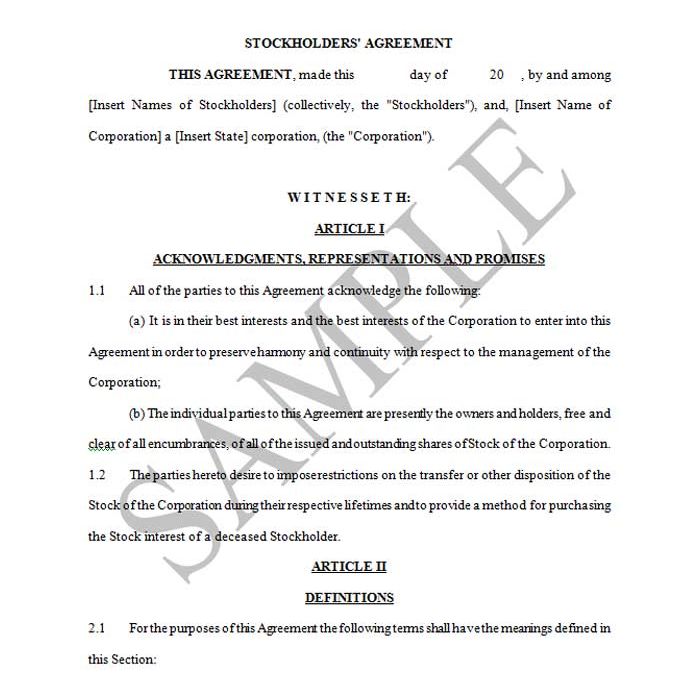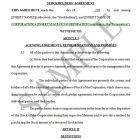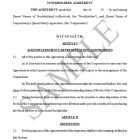2 Buy-Sell Agreement Forms (38 Pages)
SAVE when you purchase TWO Buy-Sell Agreement Forms: Buy-Sell Stockholders' Agreement: Cross-Purchase (19 Pages) AND Buy-Sell Stockholders' Agreement: Entity Purchase (19 Pages).
Each form will be stored in your master account on www.nlfforms.com for your unlimited use. Click "Learn More" for a detailed description of each Buy-Sell Agreement included in this bundle. In order to purchase a Buy-Sell Agreement individually, please click "Business Law" on the homepage.
Buy-Sell Stockholders' Agreement: Cross-Purchase (19 Pages)
This is a Cross-Purchase Stockholders’ Agreement between two stockholders and their corporation. The Agreement requires each stockholder to purchase the stock of the other in the corporation in the event of death or disability. There is also a provision requiring a stockholder wishing to sell his or her shares to give the other stockholder a right of first refusal to meet any bona fide offer (Article IV). This Agreement should be distinguished from an entity purchase agreement, where the entity itself, rather than the stockholders, is the purchaser in the event of death or disability.
This Agreement makes both death and disability mandatory purchase and sale events. In some Agreements, purchase is made optional should these events occur. The duration of disability here is twelve months of continuous disability. This can be varied to suit the parties to the Agreement. This Agreement provides for a Certificate of Value to be executed annually to establish the value of the Stock. Other alternatives here may be a formula price or an appraisal. This Agreement calls for the application of any and all insurance coverage to the extent of the purchase price, with the purchaser entitled to retain any excess. This Agreement contemplates the possibility of different purchase prices for the events of death and disability, and includes a longer-term payout of a Promissory Note to complete the disability purchase as opposed to a death purchase. (Article VIII).
Terms of the Agreement provide protection for the possibility of an S election by the corporation. The cross-purchase is generally considered more tax- advantaged than an entity purchase, especially in the case of a C corporation, where life insurance may be involved. The receipt of life insurance proceeds may be an alternative minimum tax preference to a C corporation, while it would not be for an S corporation, a partnership, an LLC taxed as a partnership, or an individual. Moreover, there is a more favorable income tax basis to the purchasing stockholder for his or her remaining interest in the corporation when a cross purchase agreement is used, as the purchased shares increase the purchasing stockholder’s basis – not the case where the entity is the purchaser of the deceased or disabled stockholder’s shares.
Buy-Sell Stockholders' Agreement: Entity Purchase (19 Pages)
This is an entity purchase Stockholders’ Agreement whereby the Corporation is the purchaser of the stock of a deceased or disabled stockholder. The Agreement addresses a number of situations where a stockholder may wish to sell his or her stock, namely a sale to a third party, death and permanent disability. Article IV gives the corporation first, then the remaining stockholders, a right of first refusal to purchase the shares of a stockholder wishing to sell. Note that the price indicated here for the “insiders” to buy is the lesser of the third-party offered price or the agreed-upon price for the stock included in the Agreement. If desired, that could be changed to force the insiders to meet the offered price.
Articles V (death) and VI (disability) require the Corporation to buy out the stockholder’s interest should either of these events occur. The stock is priced using the Certificate of Value method (Article VII). If desired, a formula or an appraisal could be substituted here. The terms of purchase contemplate the Corporation owning life or disability insurance on the stockholders (Article XII) which would be applied toward the purchase price. A withdrawing stockholder is given the opportunity to acquire a corporate-owned insurance policy. (Article XIII). Provision is made for both excess insurance proceeds (the corporation retains) and insufficient insurance proceeds (a Note arrangement) to satisfy the purchase obligation (Article VIII). Protection is included in the Agreement in the event the corporation is an S corporation. (Article XI).
Author:
Steven G. Siegel is president of The Siegel Group, which provides consulting services to attorneys, accountants, business owners, family offices and financial planners. Based in Morristown, New Jersey, the Group provides services throughout the United States.
Mr. Siegel is the author of many books, including: The Grantor Trust Answer Book (2012 and 2013 CCH); CPA’s Guide to Financial and Estate Planning (AICPA 2012); and Federal Fiduciary Income Taxation (Foxmoor 2012).
In conjunction with numerous tax planning lectures he has delivered for the National Law Foundation, Mr. Siegel has prepared extensive lecture materials on the following subjects: Planning for An Aging Population; Business Entities: Start to Finish; Preparing the Audit-Proof Federal Estate Tax Return; Business Acquisitions: Representing Buyers and Sellers in the Sale of a Business; Dynasty Trusts; Planning with Intentionally-Defective Grantor Trusts, Introduction to Estate Planning; Intermediate-Sized Estate Planning; Social Security, Medicare and Medicaid: Explanation and Planning Strategies; Subchapter S Corporations: Using Trusts as Shareholders; Divorce and Separation: Important Tax Planning Issues; The Portability Election; Generation-Skipping Transfer Tax: A Comprehensive Review; and many other titles.
Mr. Siegel has delivered hundreds of lectures to thousands of attendees in live venues and via webinars throughout the United States on tax, business and estate planning topics on behalf of numerous organizations, including The Heckerling Institute on Tax Planning, CCH, National Law Foundation, AICPA, Western CPE, the National Society of Accountants, the National Tax Institute, Cohn-Reznick, Professional Education Systems, Inc., Foxmoor Education, many State Accounting Societies and Estate Planning Councils as well as on behalf of private companies. He is presently serving as an adjunct professor of law in the Graduate Tax Program (LLM) of the University of Alabama, and has served as an adjunct professor of law at Seton Hall and Rutgers University law schools.
Mr. Siegel holds a bachelor’s degree from Georgetown University (magna cum laude, phi beta kappa), a juris doctor from Harvard Law School and an LLM in taxation from New York University Law School.




